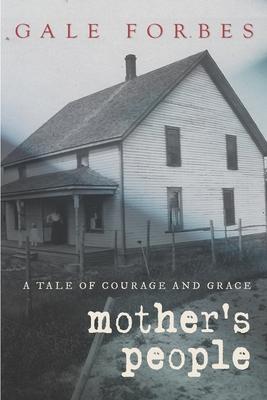
In their exile from Sweden to Germany and subsistence in a tenement, a daughter is born. Anna meets Edward and eventually becomes pregnant again. The new couple take the family to America, where Edward abandons them upon the birth of Lena.
The story switches to Anna's perspective, now with young Lena being smitten by a gentleman passing through town. Death and disease plague Anna's children, beliefs harden, and religion divides siblings. Soon, Anna discovers that the man Lena left home for is not as he appeared.
The narrative concludes as Lena, now a forsaken woman, struggles through the Great Depression trying to help her own wayward offspring.
____________
"Mother's People is an innovative, fascinating piece of historical fiction. This is not typical historical fiction. It's not the life of a well-known general or politician or movie star or athlete. While on one hand it's fiction, it is equally memoir. It takes us back to four generations of women in the author's life ... and what a journey it is! We follow them from Sweden to Germany to New York and finally to Michigan, with their misfortunes, poverty, poor choices, and struggles, but we also see their persistent spirit and endurance and determination in a time when women's voices weren't always heard. Gale Forbes has a talent for bringing the everyday details of life - clothing, home interiors, field work, transportation, medical treatment, religious practice - vividly alive. His use of imagined conversations is remarkable. This blend of memoir and fiction will surely be imitated." -Ed Demerly, author of First Years: A Farm Boy Faces the Future "Elegant and intriguing, Mother's People is a story of the challenges facing immigrants and the strengths they found in overcoming hardscrabble conditions in the early years of our developing country. Written as a novel, the author's well-defined ancestors are vividly portrayed as they strive to make their way in a new and ever-changing world." -Richard Davis, author of An American From Paris "A personal chronicle spanning 136 years, Mother's People reveals the unimaginable perseverance and will of three mothers - and provides a nice cry at the end." -Evanthea Schwartz, Page Turners Book Club
__________
A self-admitted old fart with children, grandchildren and great grandchildren, Gale Forbes readily concedes to having struggled with freshman English at the University of Michigan. During his 50-year career in architecture, he wrote essays for trade magazines, joined writing groups and attended workshops. He discovered in the art of writing fiction an essential aid in preparing technical reports: show, never tell. After finishing his first book, Exercises for Miss Melodie, a small collection of essays, an itch to discover his family roots eventually led to Mother's People. Stand by for his third book of historical fiction, Changing Time, which explores the impact of progress on a small 19th century fishing village.
In their exile from Sweden to Germany and subsistence in a tenement, a daughter is born. Anna meets Edward and eventually becomes pregnant again. The new couple take the family to America, where Edward abandons them upon the birth of Lena.
The story switches to Anna's perspective, now with young Lena being smitten by a gentleman passing through town. Death and disease plague Anna's children, beliefs harden, and religion divides siblings. Soon, Anna discovers that the man Lena left home for is not as he appeared.
The narrative concludes as Lena, now a forsaken woman, struggles through the Great Depression trying to help her own wayward offspring.
____________
"Mother's People is an innovative, fascinating piece of historical fiction. This is not typical historical fiction. It's not the life of a well-known general or politician or movie star or athlete. While on one hand it's fiction, it is equally memoir. It takes us back to four generations of women in the author's life ... and what a journey it is! We follow them from Sweden to Germany to New York and finally to Michigan, with their misfortunes, poverty, poor choices, and struggles, but we also see their persistent spirit and endurance and determination in a time when women's voices weren't always heard. Gale Forbes has a talent for bringing the everyday details of life - clothing, home interiors, field work, transportation, medical treatment, religious practice - vividly alive. His use of imagined conversations is remarkable. This blend of memoir and fiction will surely be imitated." -Ed Demerly, author of First Years: A Farm Boy Faces the Future "Elegant and intriguing, Mother's People is a story of the challenges facing immigrants and the strengths they found in overcoming hardscrabble conditions in the early years of our developing country. Written as a novel, the author's well-defined ancestors are vividly portrayed as they strive to make their way in a new and ever-changing world." -Richard Davis, author of An American From Paris "A personal chronicle spanning 136 years, Mother's People reveals the unimaginable perseverance and will of three mothers - and provides a nice cry at the end." -Evanthea Schwartz, Page Turners Book Club
__________
A self-admitted old fart with children, grandchildren and great grandchildren, Gale Forbes readily concedes to having struggled with freshman English at the University of Michigan. During his 50-year career in architecture, he wrote essays for trade magazines, joined writing groups and attended workshops. He discovered in the art of writing fiction an essential aid in preparing technical reports: show, never tell. After finishing his first book, Exercises for Miss Melodie, a small collection of essays, an itch to discover his family roots eventually led to Mother's People. Stand by for his third book of historical fiction, Changing Time, which explores the impact of progress on a small 19th century fishing village.
Paperback
$16.95